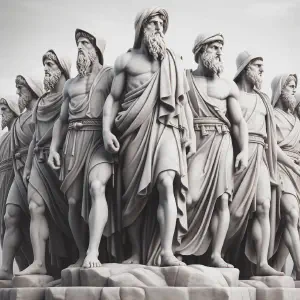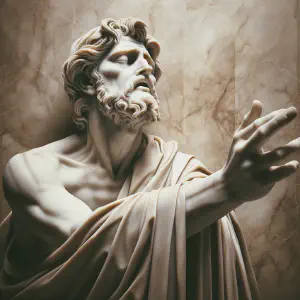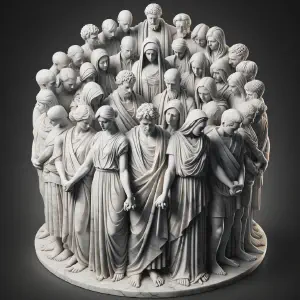A Tale of Faith and Defiance
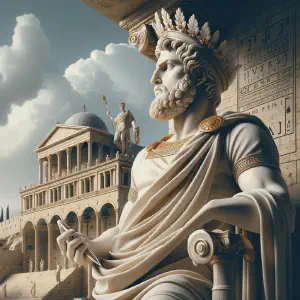
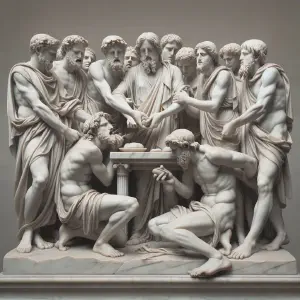
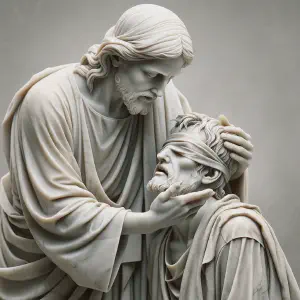
The contrasting narratives of the Israelites under Antiochus and the blind man in Jericho intertwine to form a tapestry of faith’s complexity and resilience. While the Israelites grappled with the erosion of their religious identity and the seduction of foreign customs, the blind man’s unwavering faith in Jesus exemplified individual redemption and hope. These stories collectively highlight the enduring struggle between preserving faith amidst cultural and political pressures and the transformative power of steadfast belief in the face of personal trials.
Five Questions
What is the significance of Antiochus Epiphanes’ rule in the story from 1 Maccabees?
Antiochus Epiphanes’ reign marked a period of intense Hellenization, where Jewish traditions and practices were suppressed in favor of Greek customs. This was a direct challenge to the Jewish faith and identity, as Antiochus sought to unify his kingdom under a single cultural and religious banner, disregarding the deeply held beliefs of the Jewish people. His rule represents a critical moment of cultural and religious conflict, highlighting the struggle to maintain religious identity in the face of external pressures.
How do the actions of the Israelites in Jerusalem reflect the broader theme of the story?
The Israelites who embraced Greek customs, such as building a gymnasium and abandoning the holy covenant, symbolize the temptation to conform to prevailing cultural norms, even at the cost of one’s faith and traditions. Their actions reflect a broader theme of compromise and the loss of identity. This part of the story serves as a cautionary tale about the dangers of forsaking one’s beliefs for the sake of acceptance or perceived progress.
In the Gospel of Luke, how does the healing of the blind man by Jesus contrast with the events in 1 Maccabees?
The healing of the blind man by Jesus stands in stark contrast to the events in 1 Maccabees. While the Israelites in Maccabees are seen compromising their faith and succumbing to external pressures, the blind man’s story is one of unwavering faith in the face of personal adversity. His persistent belief in Jesus, despite societal rebuke, and subsequent healing, highlights the power of faith and personal salvation, offering a hopeful counterpoint to the narrative of cultural and religious erosion in Maccabees.
What does the response of the faithful Israelites in 1 Maccabees teach us?
The response of the faithful Israelites, who chose death over defiling themselves with unclean food or abandoning their covenant with God, teaches us about the depth of commitment and sacrifice that true faith may require. Their willingness to face death rather than compromise their beliefs is a powerful testament to the strength and resilience of faith, even in the most challenging circumstances. It reminds us of the importance of steadfastness and integrity in our spiritual journey.
How can these passages from 1 Maccabees and Luke be relevant to modern readers?
These passages offer timeless lessons on the challenges of maintaining faith and identity in a world that often values conformity and secularism. They remind modern readers of the importance of staying true to one’s beliefs, even when it is unpopular or difficult. The contrast between succumbing to external pressures and standing firm in faith, as shown in these scriptures, resonates with the contemporary struggle to balance cultural integration and religious devotion. The healing of the blind man by Jesus, in particular, serves as a hopeful message that faith can lead to transformation and redemption, even in today’s complex world.
Bible Study
1 Maccabees 1:10-15, 41-43, 54-57, 62-63
[From the descendants of Alexander’s officers]
there sprang a sinful offshoot, Antiochus Epiphanes,
son of King Antiochus, once a hostage at Rome.
He became king in the year one hundred and thirty seven
of the kingdom of the Greeks.In those days there appeared in Israel
men who were breakers of the law,
and they seduced many people, saying:
“Let us go and make an alliance with the Gentiles all around us;
since we separated from them, many evils have come upon us.”
The proposal was agreeable;
some from among the people promptly went to the king,
and he authorized them to introduce the way of living
of the Gentiles.
Thereupon they built a gymnasium in Jerusalem
according to the Gentile custom.
They covered over the mark of their circumcision
and abandoned the holy covenant;
they allied themselves with the Gentiles
and sold themselves to wrongdoing.Then the king wrote to his whole kingdom that all should be one people,
each abandoning his particular customs.
All the Gentiles conformed to the command of the king,
and many children of Israel were in favor of his religion;
they sacrificed to idols and profaned the sabbath.On the fifteenth day of the month Chislev,
in the year one hundred and forty-five,
the king erected the horrible abomination
upon the altar of burnt offerings
and in the surrounding cities of Judah they built pagan altars.
They also burned incense at the doors of the houses and in the streets.
Any scrolls of the law which they found they tore up and burnt.
Whoever was found with a scroll of the covenant,
and whoever observed the law,
was condemned to death by royal decree.
But many in Israel were determined
and resolved in their hearts not to eat anything unclean;
they preferred to die rather than to be defiled with unclean food
or to profane the holy covenant; and they did die.
Terrible affliction was upon Israel.
This passage describes the rise of Antiochus Epiphanes, who, unlike his forebears, aggressively enforced Hellenistic culture upon the Jews. It illustrates the conflict between pagan customs and Jewish law. The Israelites who abandoned their covenant with God to adopt Greek practices represent a deviation from the First Commandment, highlighting the dangers of idolatry and cultural assimilation at the expense of religious identity. This narrative aligns with Catholic teachings on the importance of fidelity to God’s law and the rejection of idolatry.
Psalm 119:53, 61, 134, 150, 155, 158
R. (see 88) Give me life, O Lord, and I will do your commands.
Indignation seizes me because of the wicked
who forsake your law.
R. Give me life, O Lord, and I will do your commands.
Though the snares of the wicked are twined about me,
your law I have not forgotten.
R. Give me life, O Lord, and I will do your commands.
Redeem me from the oppression of men,
that I may keep your precepts.
R. Give me life, O Lord, and I will do your commands.
I am attacked by malicious persecutors
who are far from your law.
R. Give me life, O Lord, and I will do your commands.
Far from sinners is salvation,
because they seek not your statutes.
R. Give me life, O Lord, and I will do your commands.
I beheld the apostates with loathing,
because they kept not to your promise.
R. Give me life, O Lord, and I will do your commands.
Psalm 119 expresses the psalmist’s anguish and frustration over the wicked forsaking God’s law, reflecting a deep reverence for divine commandments. The psalmist’s yearning for God’s justice and adherence to the law, despite persecution, aligns with the Catholic emphasis on the Ten Commandments and living a life in accordance with God’s will. It also underscores the virtue of patience and the importance of divine grace in enduring trials, resonating with the Catholic understanding of suffering and perseverance in faith.
Luke 18:35-43
As Jesus approached Jericho
a blind man was sitting by the roadside begging,
and hearing a crowd going by, he inquired what was happening.
They told him,
“Jesus of Nazareth is passing by.”
He shouted, “Jesus, Son of David, have pity on me!”
The people walking in front rebuked him,
telling him to be silent,
but he kept calling out all the more,
“Son of David, have pity on me!”
Then Jesus stopped and ordered that he be brought to him;
and when he came near, Jesus asked him,
“What do you want me to do for you?”
He replied, “Lord, please let me see.”
Jesus told him, “Have sight; your faith has saved you.”
He immediately received his sight
and followed him, giving glory to God.
When they saw this, all the people gave praise to God.
This passage narrates the healing of a blind man by Jesus in Jericho. The blind man, despite societal marginalization, shows unwavering faith in Jesus’ power to heal, embodying the virtues of hope and faith. Jesus’ response to this faith, granting the man sight, highlights the significance of grace in Catholic theology - a free gift from God as a response to faith. The passage aligns with Catholic teachings on the importance of faith, the power of prayer, and Jesus’ role as a healer and redeemer, emphasizing the transformative power of divine grace.
Lessons
The passages from 1 Maccabees and the Gospel of Luke provide poignant lessons on the resilience of faith in the face of adversity and the transformative power of unwavering belief. They teach us that in times of cultural and religious upheaval, holding steadfast to one’s faith is both a challenge and a testament to spiritual fortitude. The story of the blind man’s healing by Jesus in Luke exemplifies the miraculous outcomes of persistent faith and dependence on God’s grace. These readings remind us, as followers of Christ, to remain resolute in our beliefs and trust in the Lord’s providence, even when confronted with trials and temptations.
Meditation Prayer
